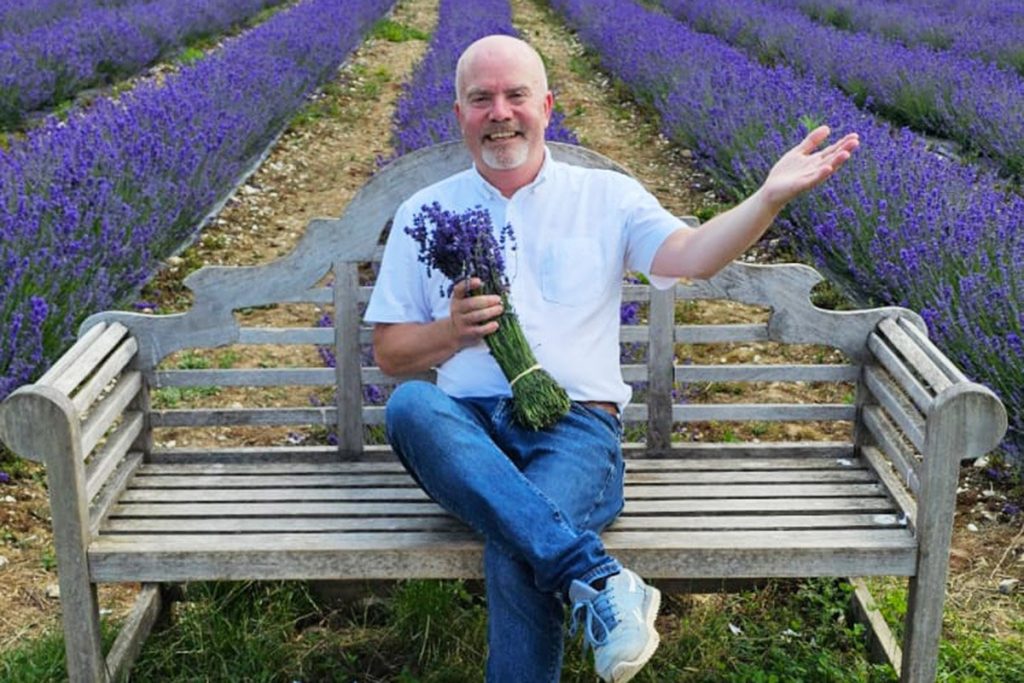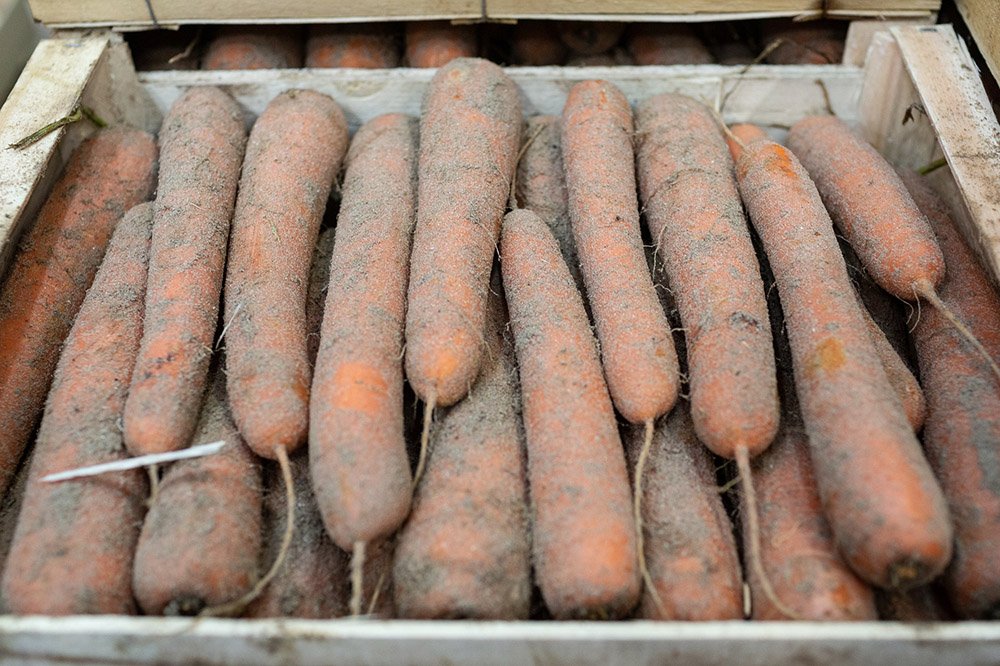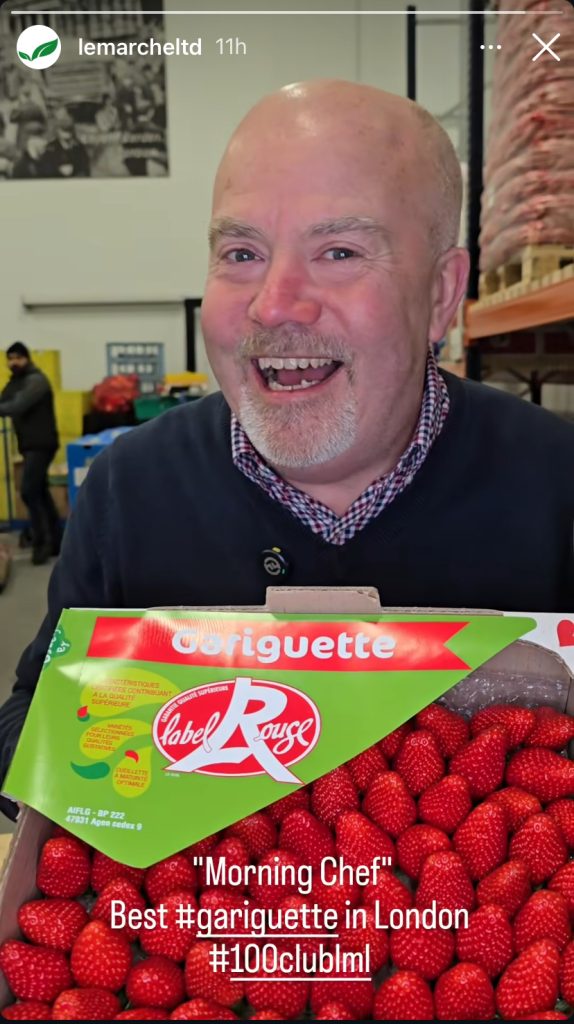
‘Bonjour, Chef!’ Marcus Rowlerson has turned a centuries-old greengrocer into an industry leader
Just six boxes of the first crop of this year’s white asparagus from Provence arrived at Rungis market in Paris earlier this month. Two boxes found their way into Parisian kitchens – the rest were snapped up by a specialist grocer based in London and shipped across the Channel.
“The asparagus was over here before most chefs in Paris knew the season had even started,” says Marcus Rowlerson, smiling at the recollection of a job done well.
Marcus is the managing director of Le Marché, an ultra-high-end grocer supplying fruit and vegetables to a hundred of the best hotels and restaurants in the country – the ‘100 Club’, he calls them.
“These are hard task masters,” he says of his clientele, although he prefers to think of them as colleagues, working as a team to satisfy the most discerning of diners. “These chefs are the nicest people in the world – until something goes wrong, when they can be very, very difficult.”
Marcus has made it his mission to ensure that, as far as humanly possible, nothing does go wrong – and that the chefs he works with have access to some of the world’s best fruit and vegetables.
To this end, he has a crack team of seven buyers – “a ridiculous number in a business this size”, he says – who between them have “a massive spider’s web of expert knowledge” about fruit and vegetables, and where to source them. Four work with the huge market at Rungis in Paris – “probably the best food market in the world, certainly in Europe” – two of whom are based in Paris and two at Le Marché’s HQ in New Covent Garden. Another buyer is based in Milan, and two more cover the British markets.
These buyers have a single overriding mission: to find the very best fruit and vegetables that exist – never mind the price. “I’m the only person to worry about cost, and sometimes it does give me a headache,” says Marcus. “One of our buyers joined from another company and would tell me had found something at a bargain price. I had to explain that wasn’t how we work – our remit is purely quality. And there’s always a reason why things are cheap – it might be a day old or whatever.”
Seasonality is crucial – “everything tastes best when it’s in season, when it’s also cheapest” – and Marcus is perhaps surprisingly old-school in sticking rigidly to traditional seasons. English asparagus, for instance, should only be eaten from April 23rd (St George’s Day, and also his wife’s birthday, which may help him remember it) to midsummer’s day.
Locality, on the other hand, is only important to him where it contributes to quality – as in the aforesaid asparagus, or forced rhubarb from Yorkshire. So while the best tomatoes have traditionally come from Italy, Marcus is a great champion of Amela tomatoes, a variety developed in Japan and now grown under licence near Granada in southern Spain, and with a Brix sweetness measure that is “off the scale”.
Le Marché’s buyers are backed up by in-house teams of packers and drivers, who ensure the produce is handled carefully and moved swiftly from market to kitchen. Very little is stored in the New Covent Garden warehouse before being sent off in deliveries to the West End and beyond.
A couple of times a month, a top chef such as Eric Chavot will come in and cook breakfast for the drivers on a burner set up on a stack of pallets in the delivery bay at New Covent Garden.
“It’s a big commitment for a chef to come in at 3.30am to cook, but it’s for a good reason,” says Marcus, who believes that good relationships within the company and with clients is what makes the business work. “We work as a team with the chefs to provide the best possible experience for the diner. The chefs don’t have a customer number, we know them all personally, so they can phone us 24 hours a day and speak to somebody who knows who they are. That is precious.”
It is not easy, though, to provide this level of service, which is why the client list is limited to 100. In fact, there is a waiting list to join this select band and a new client will only be added after detailed discussion of their requirements.
“Some chefs are surprised at having an ‘interview’ to order from us, but we really have to know we can work together for it to be worthwhile,” Marcus says.
As for new developments in fruit and vegetables, the pressure comes from both sides: chefs on the lookout for newer, better, more interesting produce to work with on the one hand, and on the other, growers developing new strains and new methods of production. Marcus and his team sit happily in the middle as a conduit between the two.
Currently, Marcus is looking to import produce directly from Japan, reflecting the ever-growing influence of Japanese cuisine in top European kitchens. Up to now chefs have tended to apply Japanese techniques to familiar European ingredients, but with greater knowledge and availability that stands to change.

All of this is a far cry from the business Marcus entered as a schoolboy in the 1980s, when he got a holiday job with his next-door-neighbour, John Bunney. John ran a 200-year-old family-based market greengrocery called John Connell, specialising in watercress – “the business was just John, a porter and me”, Marcus recalls. That may sound very niche, but as Marcus points out, watercress was the only green salad available during the winter months in England until the 1960s: “there were special trains to bring supplies into the London for the Easter holidays.”
At the end of the summer holidays, when Marcus announced he was going back to school, John offered him £50 a week to stay on. “So I never really finished my education,” says Marcus; he has never worked anywhere else, and took over the company when John retired in 2013.
He made his first important chef contact as a teenager with the great Pierre Koffmann, who would tip him 50p to load his van when he came to the market. Years later, when the traditional market was in collapse and the decision had been made to switch to providing a delivery service for high-end restaurants, Marcus thought he should look him up.
“I bluffed my way into the kitchen at the Berkeley [where Pierre ran both La Tante Claire and Koffmann’s] and luckily Pierre was in. He happened to be talking to Raphael Duntoye of La Petite Maison, and said I should meet the chef from the best restaurant in London…”
The rest, as they say is history, and Le Marché (as the company has been known since 2017) was on the way.
“Good Morning, Chef!”

The select 100 might seem a small pool, Marcus’s influence on the industry is far wider than that – not just because his clients are leaders in the field, but through the Instagram posts he initiated to keep in touch with chefs during the Covid pandemic. These have now become an institution with 95,000 followers and as many as 12 million views in a month.
Marcus posts every morning at 5am, bidding his followers “Morning, Chef!” and letting them know what the market has in store for today. “It’s totally amateurish, just me with our transport manager doing the filming,” Marcus says. “But I’ve been told that if we got a professional in to do it, it would lose what people like about it.”
In line with the company ethos, it’s very personal – and it works. Marcus and his catchphrase are well known throughout the industry. “I’ve had complete strangers calling out ‘Morning, Chef’ as I walked across Piccadilly Circus,” he says.
And with Marcus’s accountant daughter Chloe now part of the leadership team – “I’ve been helping out here since I was about eight”, she says, trumping her dad for the early start – there’s every chance the company will continue to prosper well into its third century.
Le Marche
enquiries@lemarche.limited
